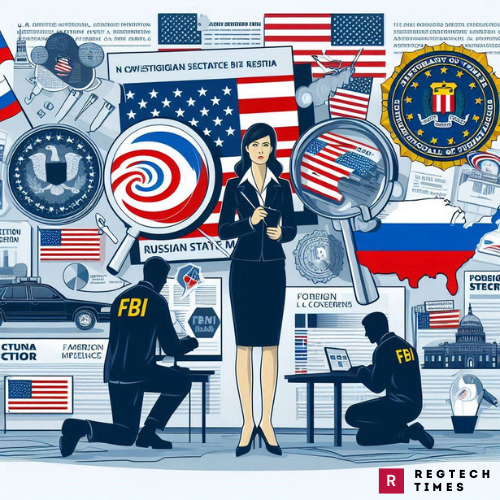In a significant and potentially far-reaching development, U.S. authorities are intensifying their scrutiny of Americans connected to Russian state media. This investigation, spearheaded by the FBI and the Department of Justice (DOJ), is a critical effort to address and mitigate foreign influence on the upcoming presidential election.
Investigation Targets Connections with Russian State Media
The FBI has recently conducted high-profile raids on the homes of Scott Ritter and Dimitri K. Simes, both of whom have notable connections to Russian state media. Scott Ritter, a former United Nations weapons inspector and outspoken critic of U.S. foreign policy, and Dimitri K. Simes, a seasoned foreign policy analyst and former adviser to Donald Trump’s 2016 presidential campaign, are now under intense scrutiny. Their links to Russian state media outlets have drawn the attention of U.S. law enforcement and intelligence agencies.
The DOJ’s investigation is focusing on potential violations of economic sanctions imposed on Russia following its invasion of Ukraine. Additionally, the inquiry examines possible breaches of the Foreign Agents Registration Act (FARA) and the International Emergency Economic Powers Act (IEEPA). Both of these laws are designed to regulate foreign influence and economic activities, and the probe seeks to determine whether Ritter and Simes have violated these regulations through their activities with Russian state media.
Political Ramifications of Russian State Media Ties
This crackdown comes at a critical time, as the U.S. approaches its presidential election in November. The Biden administration has voiced increasing concern over Russian attempts to influence American politics. The ongoing investigation reflects a broader strategy to counteract these foreign threats by targeting individuals involved with Russian state media who may be spreading disinformation or otherwise undermining U.S. interests.
U.S. May Sanction 60 Venezuelan Officials In Response to Disputed Election
For Ritter and Simes, the FBI’s actions have ignited controversy and allegations of political intimidation. Ritter, who has contributed articles to RT (Russia Today), sees the raid on his New York home as an effort to suppress his critical views on U.S. foreign policy. Similarly, Simes, who has been involved with Russian state media and hosts a talk show on Channel One, views the investigation as a politically motivated attack aimed at silencing voices advocating for improved U.S.-Russia relations.
Legal and Constitutional Challenges of Investigating
The investigation into Americans connected to Russian state media raises complex legal and constitutional issues. The First Amendment protects free speech, leading to concerns that targeting journalists and commentators might infringe on this fundamental right. However, the DOJ contends that the investigation is not about censoring free speech but rather about enforcing legal standards related to foreign influence.
Navigating the legal landscape surrounding foreign influence is complex. The FARA requires individuals working on behalf of foreign governments to register with the DOJ, but applying this requirement to journalists working for Russian state media presents challenges. Similarly, the IEEPA addresses economic sanctions, but its application to the activities of individuals linked to foreign media is not always straightforward.
Broader Impact on U.S. Democracy and Foreign Influence
This investigation highlights broader concerns about foreign interference in U.S. elections and its impact on democratic processes. The Biden administration’s increased vigilance is indicative of a commitment to protecting electoral integrity and combating disinformation. Recent actions, including the shutdown of fake social media accounts associated with Russian state media, demonstrate a proactive approach to addressing foreign influence.
US Sanctions Shatters Russian Publishers; Google Halts Adsense Payments
The scrutiny of individuals like Ritter and Simes is part of a larger effort to manage the impact of Russian state media on U.S. politics. While the immediate focus is on legal compliance, the investigation could influence future approaches to handling foreign interference and maintaining a balance between national security and civil liberties.
The U.S. investigation into connections with Russian state media represents a pivotal moment in efforts to combat foreign interference in American politics. As the country prepares for a high-stakes presidential election, the outcomes of this probe could have significant implications for both domestic policy and international relations. Balancing national security concerns with constitutional rights will be a critical challenge as the investigation unfolds, shaping the future of U.S. foreign policy and its approach to addressing foreign influence.


